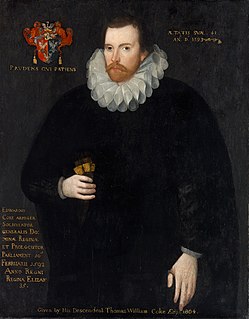Related Research Articles
Habeas corpus is a recourse in law through which a person can report an unlawful detention or imprisonment to a court and request that the court order the custodian of the person, usually a prison official, to bring the prisoner to court, to determine whether the detention is lawful.

Ex parte Merryman, 17 F. Cas. 144 (No. 9487), is a well-known and controversial U.S. federal court case that arose out of the American Civil War. It was a test of the authority of the President to suspend "the privilege of the writ of habeas corpus" under the Constitution's Suspension Clause, when Congress was in recess and therefore unavailable to do so itself. More generally, the case raised questions about the ability of the executive branch to decline enforcement of judicial decisions when the executive believes them to be erroneous and harmful to its own legal powers.

Sir Edward Coke was an English barrister, judge, and politician who is considered the greatest jurist of the Elizabethan and Jacobean eras.

Charles Pinckney was an American Founding Father, planter, and politician who was a signer of the United States Constitution. He was elected and served as the 37th governor of South Carolina, later serving two more non-consecutive terms. He also served as a U.S. Senator and a member of the House of Representatives. He was first cousin once removed of fellow signer Charles Cotesworth Pinckney.

William Murray, 1st Earl of Mansfield, PC, SL was a British barrister, politician and judge noted for his reform of English law. Born to Scottish nobility, he was educated in Perth, Scotland, before moving to London at the age of 13 to take up a place at Westminster School. He was accepted into Christ Church, Oxford, in May 1723, and graduated four years later. Returning to London from Oxford, he was called to the Bar by Lincoln's Inn on 23 November 1730, and quickly gained a reputation as an excellent barrister.
The Habeas Corpus Act 1679 is an Act of Parliament in England during the reign of King Charles II. It was passed by what became known as the Habeas Corpus Parliament to define and strengthen the ancient prerogative writ of habeas corpus, which required a court to examine the lawfulness of a prisoner's detention and thus prevent unlawful or arbitrary imprisonment.

A Serjeant-at-Law (SL), commonly known simply as a Serjeant, was a member of an order of barristers at the English and Irish Bar. The position of Serjeant-at-Law, or Sergeant-Counter, was centuries old; there are writs dating to 1300 which identify them as descended from figures in France before the Norman Conquest, thus the Serjeants are said to be the oldest formally created order in England. The order rose during the 16th century as a small, elite group of lawyers who took much of the work in the central common law courts.
In United States law, habeas corpus is a recourse challenging the reasons or conditions of a person's confinement under color of law. A petition for habeas corpus is filed with a court that has jurisdiction over the custodian, and if granted, a writ is issued directing the custodian to bring the confined person before the court for examination into those reasons or conditions. The Suspension Clause of the United States Constitution specifically included the English common law procedure in Article One, Section 9, clause 2, which demands that "The privilege of the writ of habeas corpus shall not be suspended, unless when in cases of rebellion or invasion the public safety may require it."

Serjeant John Hoskins or Hoskyns was an English poet, scholar of Greek, lawyer, judge and politician.
Boumediene v. Bush, 553 U.S. 723 (2008), was a writ of habeas corpus submission made in a civilian court of the United States on behalf of Lakhdar Boumediene, a naturalized citizen of Bosnia and Herzegovina, held in military detention by the United States at the Guantanamo Bay detention camps in Cuba. Guantánamo Bay is not formally part of the United States, and under the terms of the 1903 lease between the United States and Cuba, Cuba retained ultimate sovereignty over the territory, while the United States exercises complete jurisdiction and control. The case was consolidated with habeas petition Al Odah v. United States. It challenged the legality of Boumediene's detention at the United States Naval Station military base in Guantanamo Bay, Cuba as well as the constitutionality of the Military Commissions Act of 2006. Oral arguments on the combined cases were heard by the Supreme Court on December 5, 2007.
In United States law, habeas corpus is a recourse challenging the reasons or conditions of a person's detention under color of law. The Guantanamo Bay detention camp is a United States military prison located within Guantanamo Bay Naval Base. A persistent standard of indefinite detention without trial and incidents of torture led the operations of the Guantanamo Bay detention camp to be challenged internationally as an affront to international human rights, and challenged domestically as a violation of the Due Process Clause of the Fifth and Fourteenth amendments of the United States Constitution, including the right of petition for habeas corpus. In 19 February 2002, Guantanamo detainees petitioned in federal court for a writ of habeas corpus to review the legality of their detention.
William Willoughby, 3rd Baron Willoughby of Parham was an English peer.
The Habeas Corpus Bill of 1758 was a failed bill that would have extended habeas corpus if passed.
Samuel Heywood (1753–1828) was an English serjeant-at-law and a Chief Justice of the Carmarthen Circuit of Wales.
William Hawkins (1682–1750) was a barrister and serjeant-at-law, best known for his work on the English criminal law, Treatise of Pleas of the Crown.
Somerset v Stewart (1772) [98 ER 499] is a judgment of the English Court of King's Bench in 1772, relating to the right of an enslaved person on English soil not to be forcibly removed from the country and sent to Jamaica for sale. Lord Mansfield decided that:
The state of slavery is of such a nature that it is incapable of being introduced on any reasons, moral or political, but only by positive law, which preserves its force long after the reasons, occasions, and time itself from whence it was created, is erased from memory. It is so odious, that nothing can be suffered to support it, but positive law. Whatever inconveniences, therefore, may follow from the decision, I cannot say this case is allowed or approved by the law of England; and therefore the black must be discharged.

The Habeas Corpus Suspension Act, 12 Stat. 755 (1863), entitled An Act relating to Habeas Corpus, and regulating Judicial Proceedings in Certain Cases, was an Act of Congress that authorized the president of the United States to suspend the right of habeas corpus in response to the American Civil War and provided for the release of political prisoners. It began in the House of Representatives as an indemnity bill, introduced on December 5, 1862, releasing the president and his subordinates from any liability for having suspended habeas corpus without congressional approval. The Senate amended the House's bill, and the compromise reported out of the conference committee altered it to qualify the indemnity and to suspend habeas corpus on Congress's own authority. Abraham Lincoln signed the bill into law on March 3, 1863, and suspended habeas corpus under the authority it granted him six months later. The suspension was partially lifted with the issuance of Proclamation 148 by Andrew Johnson, and the Act became inoperative with the end of the Civil War. The exceptions to his Proclamation 148 were the States of Virginia, Kentucky, Tennessee, North Carolina, South Carolina, Georgia, Florida, Alabama, Mississippi, Louisiana, Arkansas, and Texas, the District of Columbia, and the Territories of New Mexico and Arizona.
The Habeas Corpus Act of 1867 is an act of Congress that significantly expanded the jurisdiction of federal courts to issue writs of habeas corpus. Passed February 5, 1867, the Act amended the Judiciary Act of 1789 to grant the courts the power to issue writs of habeas corpus "in all cases where any person may be restrained of his or her liberty in violation of the constitution, or any treaty or law of the United States." Prior to the Act's passage, prisoners in the custody of one of the states who wished to challenge the legality of their detention could petition for a writ of habeas corpus only in state courts; the federal court system was barred from issuing writs of habeas corpus in their cases. The Act also permitted the court "to go beyond the return" and question the truth of the jailer's stated justification for detaining the petitioning prisoner, whereas prior to the Act courts were technically bound to accept the jailer's word that the prisoner was actually being held for the reason stated. The Act largely restored habeas corpus following its 1863 suspension by Congress, ensuring that anyone arrested after its passage could challenge their detention in the federal courts, but denied habeas relief to anyone who was already in military custody for any military offense or for having aided the Confederacy.

The Nonhuman Rights Project (NhRP) is an American nonprofit animal rights organization seeking to change the legal status of at least some nonhuman animals from that of property to that of persons, with a goal of securing rights to bodily liberty and bodily integrity. The NhRP works largely through state-by-state litigation in what it determines to be the most appropriate common law jurisdictions and bases its arguments on existing scientific evidence concerning self-awareness and autonomy in nonhuman animals. Its sustained strategic litigation campaign has been developed primarily by a team of attorneys, legal experts, and volunteer law students who have conducted extensive research into relevant legal precedents. The NhRP filed its first lawsuits in December 2013 on behalf of four chimpanzees held in captivity in New York State. In late 2014, NhRP President Steven Wise and Executive Director Natalie Prosin announced in the Global Journal of Animal Law that the Nonhuman Rights Project was expanding its work into other countries, beginning in Switzerland, Argentina, England, Spain, Portugal, and Australia.
Humphry William Woolrych (1795–1871) was an English lawyer, known as a legal writer and biographer.
References
- ↑ Wise 2005 , p. 116
- ↑ Woolrych 1869 , p. 605
- ↑ Woolrych 1869 , p. 606
- ↑ Woolrych 1869 , p. 616
- ↑ Wise 2005 , p. 117
- ↑ Wise 2005 , p. 139
- ↑ Wise 2005 , p. 222
- ↑ Woolrych 1869 , p. 632